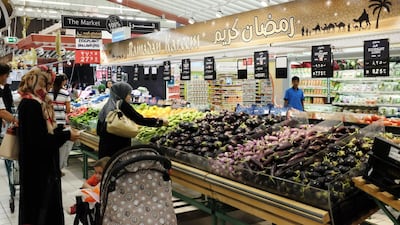The first time Greta Thunberg tried to get her parents to become vegan, they were not convinced. Eating meat is a major contributor to climate change and becoming vegan is one way to tackle it. But these and other appeals to logic made by the young climate activist didn’t seem to work for her parents until, that is, she told them they were ‘stealing our future.’
Thunberg is part of the growing vegan movement. This year's 'Veganuary' – an effort to promote veganism in the first month of the year – just finished, and saw participation from individuals in 193 countries. It was the most popular one since it started in January 2014. The global vegan market is estimated to reach almost Dh120 billion by 2026. Burger King, KFC and McDonalds have all launched vegan options.
Besides its role in fighting climate change, vegans typically cite health and ethics as key motivations in maintaining their diet. When it comes to health, many adherents say a vegan diet improves both their physical and mental well-being.
They decry taking animal life in the service of human tastes – especially if the animal is treated cruelly – as deeply unethical.
But for the world’s 1.8 billion Muslims, there’s another big, ethical motivation and the opportunity is wildly underestimated: halal vegan products.
One of the fundamental tenets of Islam for many Muslims is the prescription to consume only halal products, of which meat tops the list. Meat is often at the heart of cultural life in Muslim families and communities. In the UK, for example, Muslims make up just over 4 per cent of the population but consume around 20 per cent of the lamb and mutton. During the religious festival of Eid Al Adha, meat is traditionally distributed to the poor. While respecting the religious traditions of Eid – in which animal sacrifice and feeding the poor are important and deeply meaningful rituals – some younger Muslims are choosing a vegan lifestyle in keeping with their evolving views on animal rights, climate change and health. Most interestingly, this generation of vegan Muslims is firm in the belief that their vegan lifestyle aligns more closely to their Muslim beliefs.
Very often in Muslim families, these passionate, new beliefs among the young are met with equally passionate disbelief – sometimes even outright rejection – from their parents or grandparents. Vegan Muslims speak of being mocked or ostracised.
But there are interesting developments: a vegan Eid, taking place alongside the traditional version of the festival, is now an established idea, even if it is not yet widely entrenched in practice. Even the notion of a vegan Ramadan (‘Veganadan’) is gaining traction.
Muslim vegans cite Islam’s heavy focus on morality and animal welfare as the impetus for becoming vegan. They point to the Quran’s stipulation that food be not only ‘halal’ – meaning permissible – but also ‘tayyab’ meaning good and wholesome. Some quote an old saying: “do not make your stomach a graveyard for animals.” For them, the mass-industrialised nature of the halal meat sector falls far short of the values they aspire to. Veganism might not be for all Muslims, but the zeal of its proponents will still benefit the wider Muslim community by putting a spotlight on halal meat production and driving a shift in attitudes.
Halal certified vegan products also offer the benefit of culinary variety, with wider choice and availability. It is a lucrative brand opportunity, with the total halal food market estimated to grow to Dh7.24 trillion by 2024.
The suitability of halal vegan products for Muslims is so obvious that you wonder why all plant-based brands aren’t racing at light speed to get their halal certification. More importantly, why aren’t they running proactive branding and engagement campaigns for Muslim audiences? With halal credentials under their belt, they would be well placed to appeal to young Muslims, not to mention act as an alternative to meat in family and community settings. For smart brands, this intersection between halal and vegan is there for the taking. Why shouldn’t Muslims aspire towards healthy, environmentally conscious lifestyles, too?
The opportunity is coming to life. Later this month, the Gulfood trade fair in Dubai will celebrate its 25th anniversary and feature vegan offerings as part of its Halal World Food exhibition. Last month, Impossible Foods added “Impossible Pork” to its halal certified range. Although, as to whether or not people who’ve never eaten pork will care for a replica version – only time will tell.
Finally, there is one more social aspect to halal vegan products, which, in my view, may be the most appealing. Food is a way to build bonds. Halal certified vegan foods have the power to do exactly that because they can respect multiple different dietary choices, bringing people together over a meal and allowing them to connect over shared ethical, environmental and social concerns, without anyone having to compromise their own positions or principles. All of this is to say that rather than futures stolen, a shared future might be exactly the kind of thing we hope for.
Shelina Janmohamed is the author of Love in a Headscarf and Generation M: Young Muslims Changing the World


